Grand Ethiopian Renaissance Dam: Complex Project Management Issues
VerifiedAdded on 2023/04/03
|7
|1300
|153
Report
AI Summary
This report provides an in-depth analysis of the complex project management issues surrounding the Grand Ethiopian Renaissance Dam (GERD) project, drawing upon insights from the ICCPM roundtable. It identifies key challenges related to project funding, emphasizing the difficulties in securing international support due to political tensions and the reliance on local funding, which complicates the financial structure. The report also addresses the project's inherent complexity due to its massive size and the advanced technical requirements for dam construction. Furthermore, it examines the ambiguity arising from conflicting stakeholder perspectives on project success, the lack of coordination, and the differing views on the project's social and environmental impact. The dynamics influencing the project, such as political and economic changes, and the uncertainty surrounding the evaluation of the project's impacts are also explored. The report concludes by highlighting the social dimensions of complexity, including the historical disputes over Nile water rights and the varying perspectives on the project's potential for social reform, ultimately contributing to a comprehensive understanding of the challenges facing the GERD project.
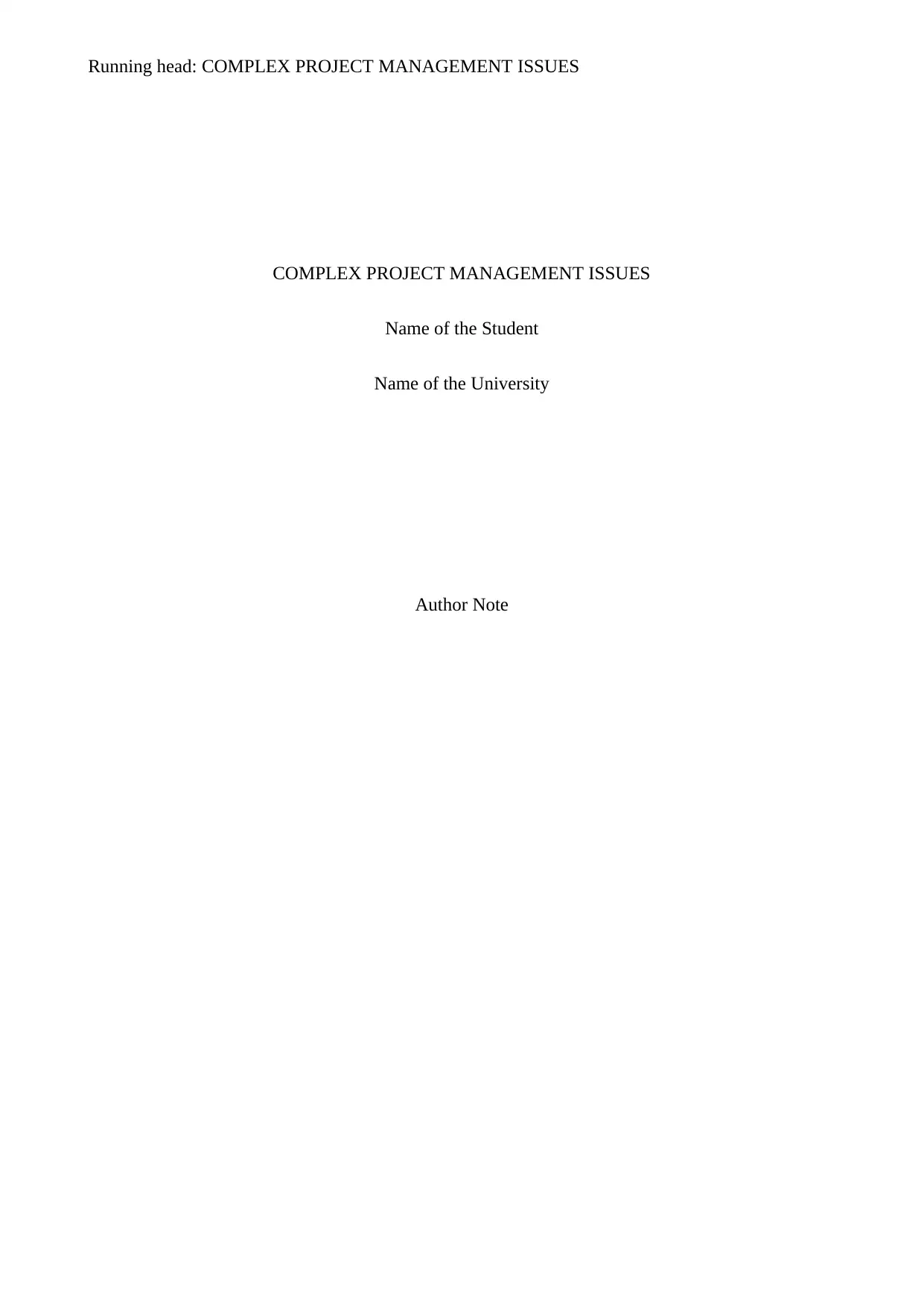
Running head: COMPLEX PROJECT MANAGEMENT ISSUES
COMPLEX PROJECT MANAGEMENT ISSUES
Name of the Student
Name of the University
Author Note
COMPLEX PROJECT MANAGEMENT ISSUES
Name of the Student
Name of the University
Author Note
Paraphrase This Document
Need a fresh take? Get an instant paraphrase of this document with our AI Paraphraser
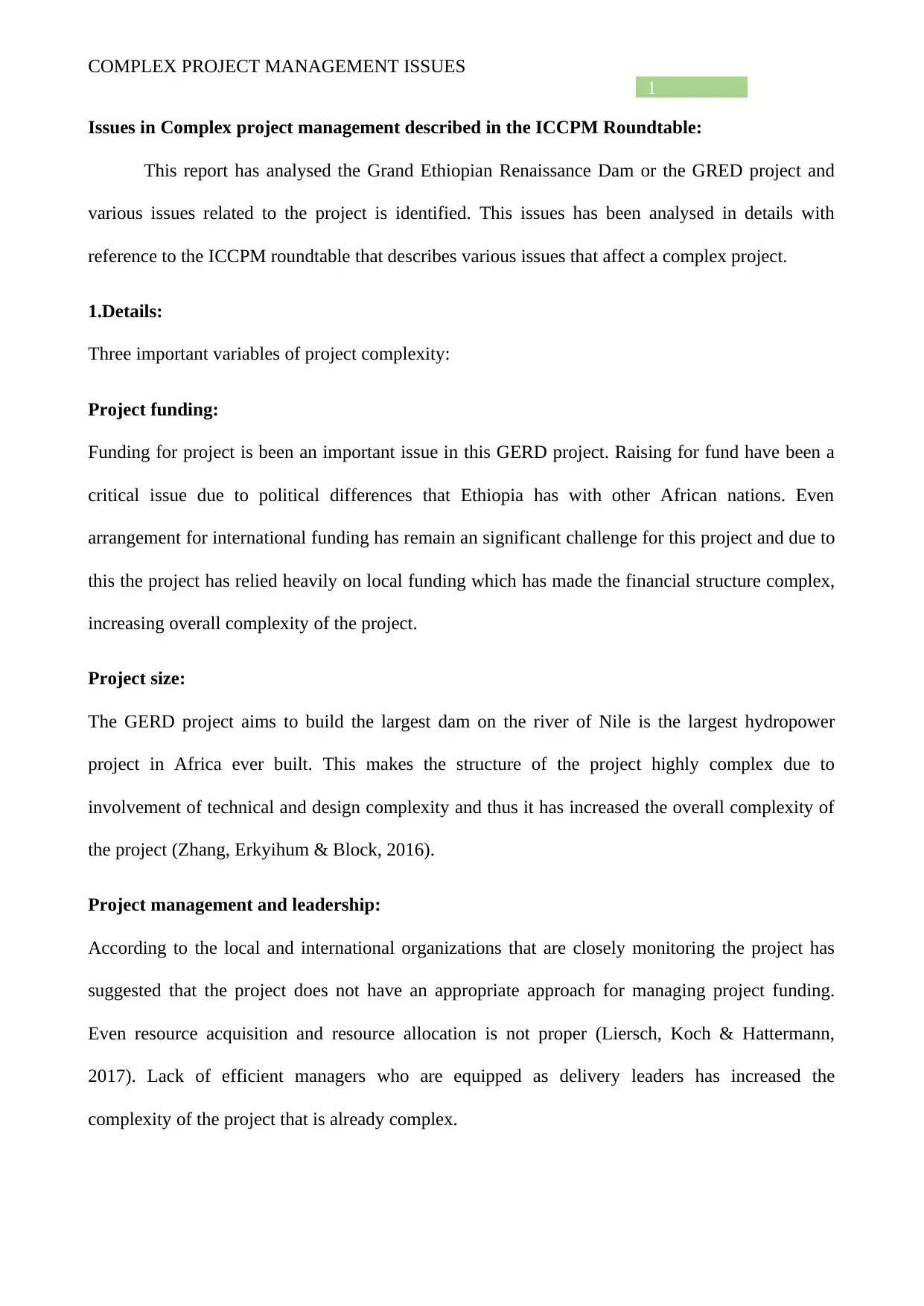
1
COMPLEX PROJECT MANAGEMENT ISSUES
Issues in Complex project management described in the ICCPM Roundtable:
This report has analysed the Grand Ethiopian Renaissance Dam or the GRED project and
various issues related to the project is identified. This issues has been analysed in details with
reference to the ICCPM roundtable that describes various issues that affect a complex project.
1.Details:
Three important variables of project complexity:
Project funding:
Funding for project is been an important issue in this GERD project. Raising for fund have been a
critical issue due to political differences that Ethiopia has with other African nations. Even
arrangement for international funding has remain an significant challenge for this project and due to
this the project has relied heavily on local funding which has made the financial structure complex,
increasing overall complexity of the project.
Project size:
The GERD project aims to build the largest dam on the river of Nile is the largest hydropower
project in Africa ever built. This makes the structure of the project highly complex due to
involvement of technical and design complexity and thus it has increased the overall complexity of
the project (Zhang, Erkyihum & Block, 2016).
Project management and leadership:
According to the local and international organizations that are closely monitoring the project has
suggested that the project does not have an appropriate approach for managing project funding.
Even resource acquisition and resource allocation is not proper (Liersch, Koch & Hattermann,
2017). Lack of efficient managers who are equipped as delivery leaders has increased the
complexity of the project that is already complex.
COMPLEX PROJECT MANAGEMENT ISSUES
Issues in Complex project management described in the ICCPM Roundtable:
This report has analysed the Grand Ethiopian Renaissance Dam or the GRED project and
various issues related to the project is identified. This issues has been analysed in details with
reference to the ICCPM roundtable that describes various issues that affect a complex project.
1.Details:
Three important variables of project complexity:
Project funding:
Funding for project is been an important issue in this GERD project. Raising for fund have been a
critical issue due to political differences that Ethiopia has with other African nations. Even
arrangement for international funding has remain an significant challenge for this project and due to
this the project has relied heavily on local funding which has made the financial structure complex,
increasing overall complexity of the project.
Project size:
The GERD project aims to build the largest dam on the river of Nile is the largest hydropower
project in Africa ever built. This makes the structure of the project highly complex due to
involvement of technical and design complexity and thus it has increased the overall complexity of
the project (Zhang, Erkyihum & Block, 2016).
Project management and leadership:
According to the local and international organizations that are closely monitoring the project has
suggested that the project does not have an appropriate approach for managing project funding.
Even resource acquisition and resource allocation is not proper (Liersch, Koch & Hattermann,
2017). Lack of efficient managers who are equipped as delivery leaders has increased the
complexity of the project that is already complex.
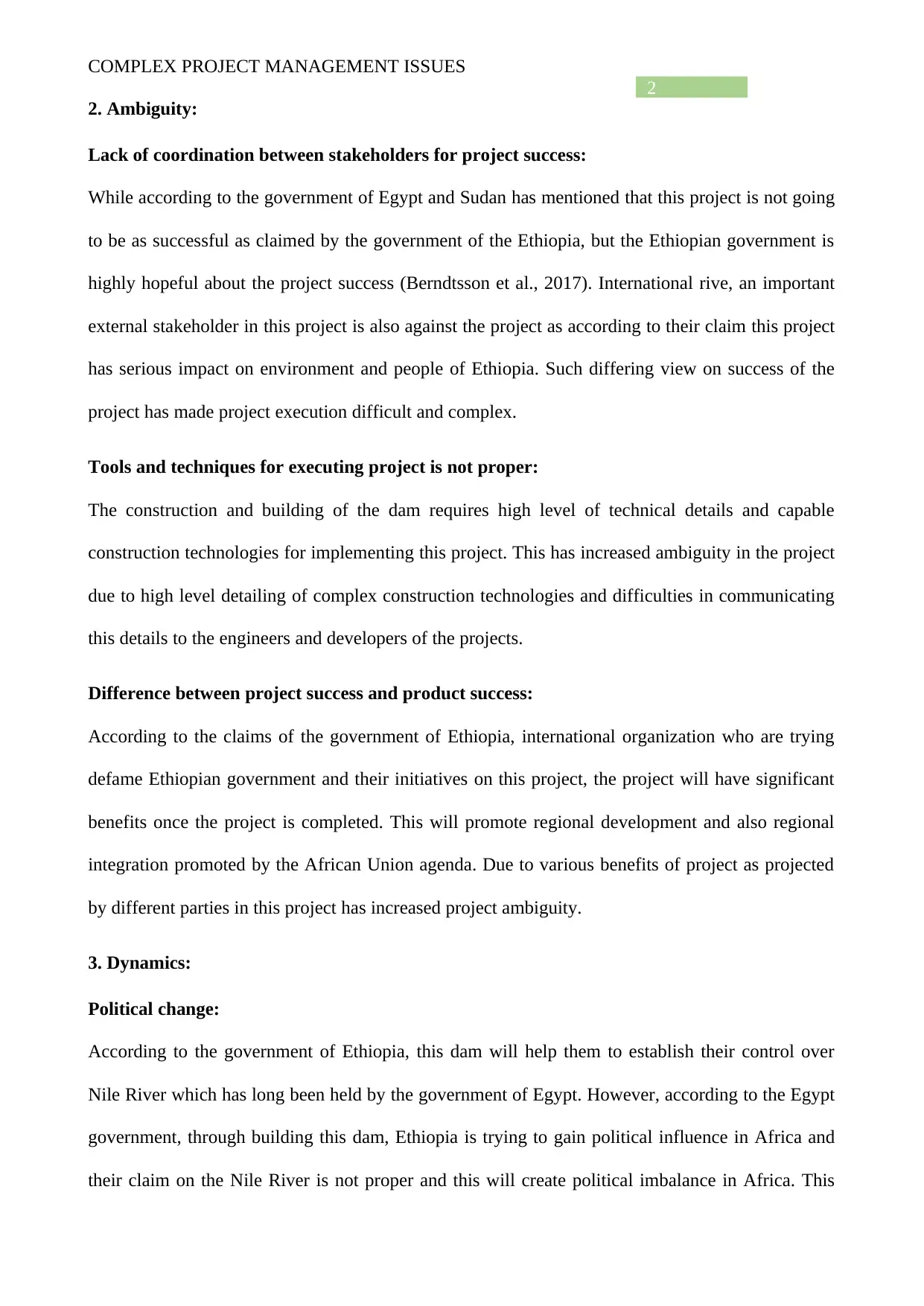
2
COMPLEX PROJECT MANAGEMENT ISSUES
2. Ambiguity:
Lack of coordination between stakeholders for project success:
While according to the government of Egypt and Sudan has mentioned that this project is not going
to be as successful as claimed by the government of the Ethiopia, but the Ethiopian government is
highly hopeful about the project success (Berndtsson et al., 2017). International rive, an important
external stakeholder in this project is also against the project as according to their claim this project
has serious impact on environment and people of Ethiopia. Such differing view on success of the
project has made project execution difficult and complex.
Tools and techniques for executing project is not proper:
The construction and building of the dam requires high level of technical details and capable
construction technologies for implementing this project. This has increased ambiguity in the project
due to high level detailing of complex construction technologies and difficulties in communicating
this details to the engineers and developers of the projects.
Difference between project success and product success:
According to the claims of the government of Ethiopia, international organization who are trying
defame Ethiopian government and their initiatives on this project, the project will have significant
benefits once the project is completed. This will promote regional development and also regional
integration promoted by the African Union agenda. Due to various benefits of project as projected
by different parties in this project has increased project ambiguity.
3. Dynamics:
Political change:
According to the government of Ethiopia, this dam will help them to establish their control over
Nile River which has long been held by the government of Egypt. However, according to the Egypt
government, through building this dam, Ethiopia is trying to gain political influence in Africa and
their claim on the Nile River is not proper and this will create political imbalance in Africa. This
COMPLEX PROJECT MANAGEMENT ISSUES
2. Ambiguity:
Lack of coordination between stakeholders for project success:
While according to the government of Egypt and Sudan has mentioned that this project is not going
to be as successful as claimed by the government of the Ethiopia, but the Ethiopian government is
highly hopeful about the project success (Berndtsson et al., 2017). International rive, an important
external stakeholder in this project is also against the project as according to their claim this project
has serious impact on environment and people of Ethiopia. Such differing view on success of the
project has made project execution difficult and complex.
Tools and techniques for executing project is not proper:
The construction and building of the dam requires high level of technical details and capable
construction technologies for implementing this project. This has increased ambiguity in the project
due to high level detailing of complex construction technologies and difficulties in communicating
this details to the engineers and developers of the projects.
Difference between project success and product success:
According to the claims of the government of Ethiopia, international organization who are trying
defame Ethiopian government and their initiatives on this project, the project will have significant
benefits once the project is completed. This will promote regional development and also regional
integration promoted by the African Union agenda. Due to various benefits of project as projected
by different parties in this project has increased project ambiguity.
3. Dynamics:
Political change:
According to the government of Ethiopia, this dam will help them to establish their control over
Nile River which has long been held by the government of Egypt. However, according to the Egypt
government, through building this dam, Ethiopia is trying to gain political influence in Africa and
their claim on the Nile River is not proper and this will create political imbalance in Africa. This
⊘ This is a preview!⊘
Do you want full access?
Subscribe today to unlock all pages.

Trusted by 1+ million students worldwide
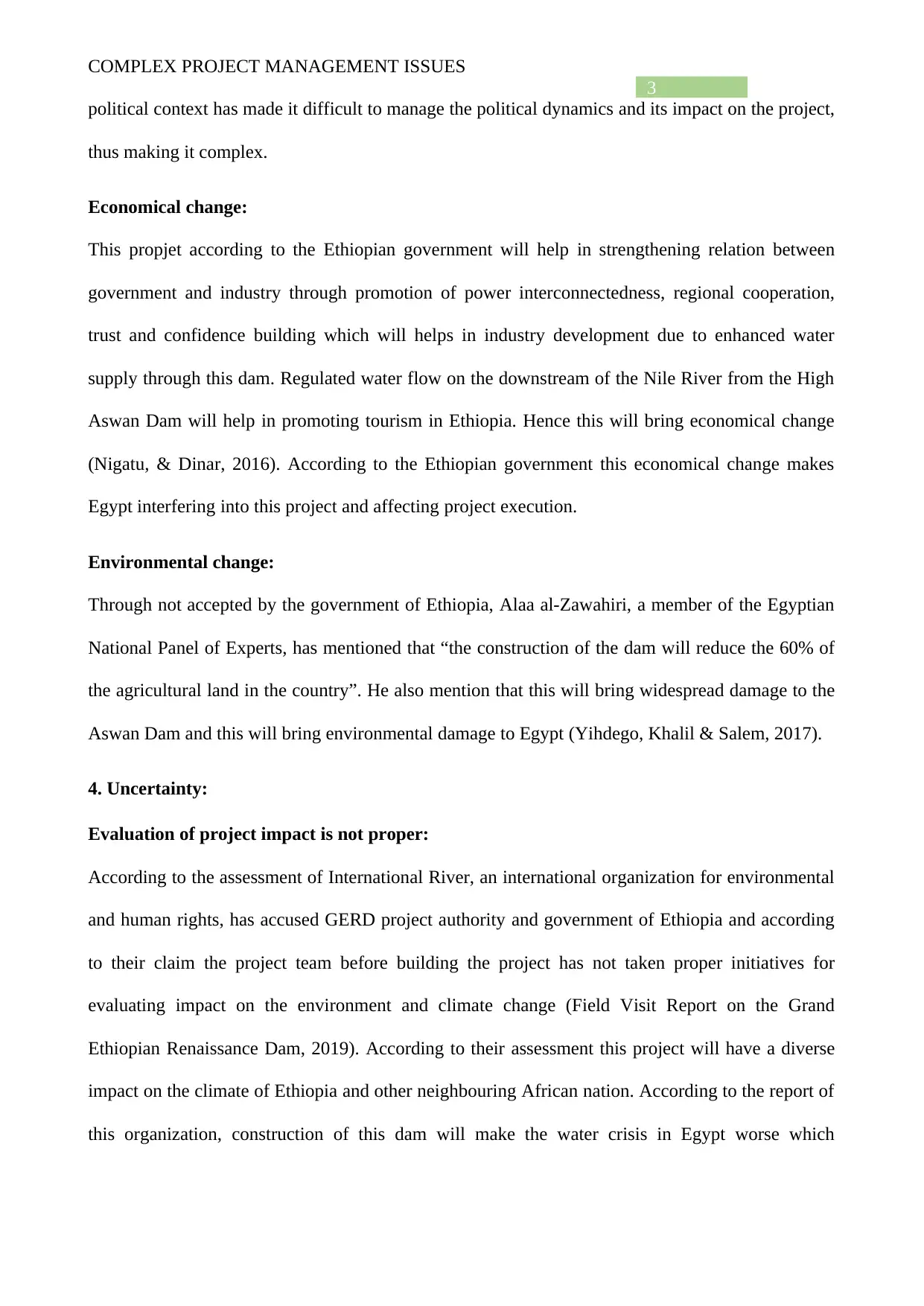
3
COMPLEX PROJECT MANAGEMENT ISSUES
political context has made it difficult to manage the political dynamics and its impact on the project,
thus making it complex.
Economical change:
This propjet according to the Ethiopian government will help in strengthening relation between
government and industry through promotion of power interconnectedness, regional cooperation,
trust and confidence building which will helps in industry development due to enhanced water
supply through this dam. Regulated water flow on the downstream of the Nile River from the High
Aswan Dam will help in promoting tourism in Ethiopia. Hence this will bring economical change
(Nigatu, & Dinar, 2016). According to the Ethiopian government this economical change makes
Egypt interfering into this project and affecting project execution.
Environmental change:
Through not accepted by the government of Ethiopia, Alaa al-Zawahiri, a member of the Egyptian
National Panel of Experts, has mentioned that “the construction of the dam will reduce the 60% of
the agricultural land in the country”. He also mention that this will bring widespread damage to the
Aswan Dam and this will bring environmental damage to Egypt (Yihdego, Khalil & Salem, 2017).
4. Uncertainty:
Evaluation of project impact is not proper:
According to the assessment of International River, an international organization for environmental
and human rights, has accused GERD project authority and government of Ethiopia and according
to their claim the project team before building the project has not taken proper initiatives for
evaluating impact on the environment and climate change (Field Visit Report on the Grand
Ethiopian Renaissance Dam, 2019). According to their assessment this project will have a diverse
impact on the climate of Ethiopia and other neighbouring African nation. According to the report of
this organization, construction of this dam will make the water crisis in Egypt worse which
COMPLEX PROJECT MANAGEMENT ISSUES
political context has made it difficult to manage the political dynamics and its impact on the project,
thus making it complex.
Economical change:
This propjet according to the Ethiopian government will help in strengthening relation between
government and industry through promotion of power interconnectedness, regional cooperation,
trust and confidence building which will helps in industry development due to enhanced water
supply through this dam. Regulated water flow on the downstream of the Nile River from the High
Aswan Dam will help in promoting tourism in Ethiopia. Hence this will bring economical change
(Nigatu, & Dinar, 2016). According to the Ethiopian government this economical change makes
Egypt interfering into this project and affecting project execution.
Environmental change:
Through not accepted by the government of Ethiopia, Alaa al-Zawahiri, a member of the Egyptian
National Panel of Experts, has mentioned that “the construction of the dam will reduce the 60% of
the agricultural land in the country”. He also mention that this will bring widespread damage to the
Aswan Dam and this will bring environmental damage to Egypt (Yihdego, Khalil & Salem, 2017).
4. Uncertainty:
Evaluation of project impact is not proper:
According to the assessment of International River, an international organization for environmental
and human rights, has accused GERD project authority and government of Ethiopia and according
to their claim the project team before building the project has not taken proper initiatives for
evaluating impact on the environment and climate change (Field Visit Report on the Grand
Ethiopian Renaissance Dam, 2019). According to their assessment this project will have a diverse
impact on the climate of Ethiopia and other neighbouring African nation. According to the report of
this organization, construction of this dam will make the water crisis in Egypt worse which
Paraphrase This Document
Need a fresh take? Get an instant paraphrase of this document with our AI Paraphraser
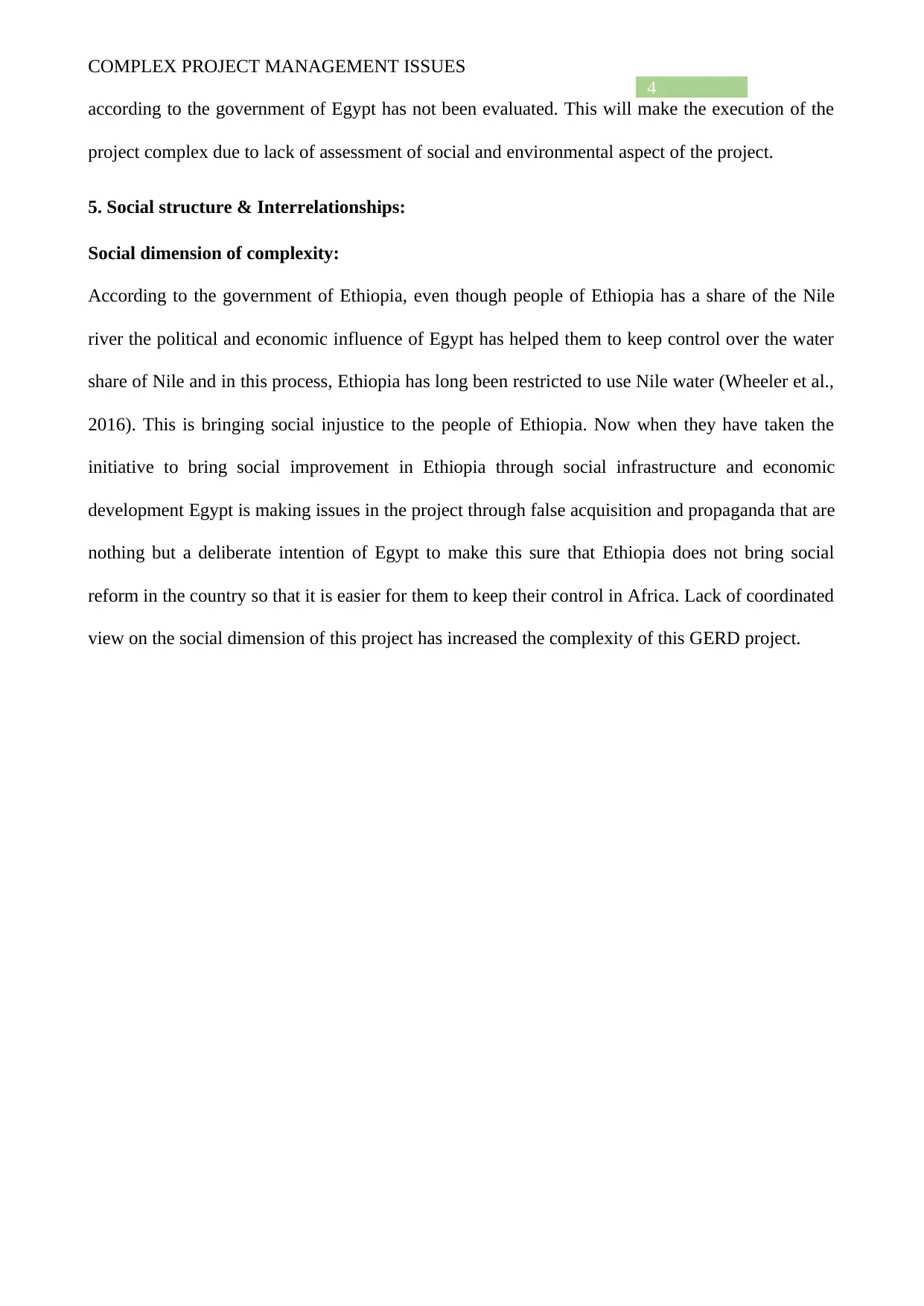
4
COMPLEX PROJECT MANAGEMENT ISSUES
according to the government of Egypt has not been evaluated. This will make the execution of the
project complex due to lack of assessment of social and environmental aspect of the project.
5. Social structure & Interrelationships:
Social dimension of complexity:
According to the government of Ethiopia, even though people of Ethiopia has a share of the Nile
river the political and economic influence of Egypt has helped them to keep control over the water
share of Nile and in this process, Ethiopia has long been restricted to use Nile water (Wheeler et al.,
2016). This is bringing social injustice to the people of Ethiopia. Now when they have taken the
initiative to bring social improvement in Ethiopia through social infrastructure and economic
development Egypt is making issues in the project through false acquisition and propaganda that are
nothing but a deliberate intention of Egypt to make this sure that Ethiopia does not bring social
reform in the country so that it is easier for them to keep their control in Africa. Lack of coordinated
view on the social dimension of this project has increased the complexity of this GERD project.
COMPLEX PROJECT MANAGEMENT ISSUES
according to the government of Egypt has not been evaluated. This will make the execution of the
project complex due to lack of assessment of social and environmental aspect of the project.
5. Social structure & Interrelationships:
Social dimension of complexity:
According to the government of Ethiopia, even though people of Ethiopia has a share of the Nile
river the political and economic influence of Egypt has helped them to keep control over the water
share of Nile and in this process, Ethiopia has long been restricted to use Nile water (Wheeler et al.,
2016). This is bringing social injustice to the people of Ethiopia. Now when they have taken the
initiative to bring social improvement in Ethiopia through social infrastructure and economic
development Egypt is making issues in the project through false acquisition and propaganda that are
nothing but a deliberate intention of Egypt to make this sure that Ethiopia does not bring social
reform in the country so that it is easier for them to keep their control in Africa. Lack of coordinated
view on the social dimension of this project has increased the complexity of this GERD project.
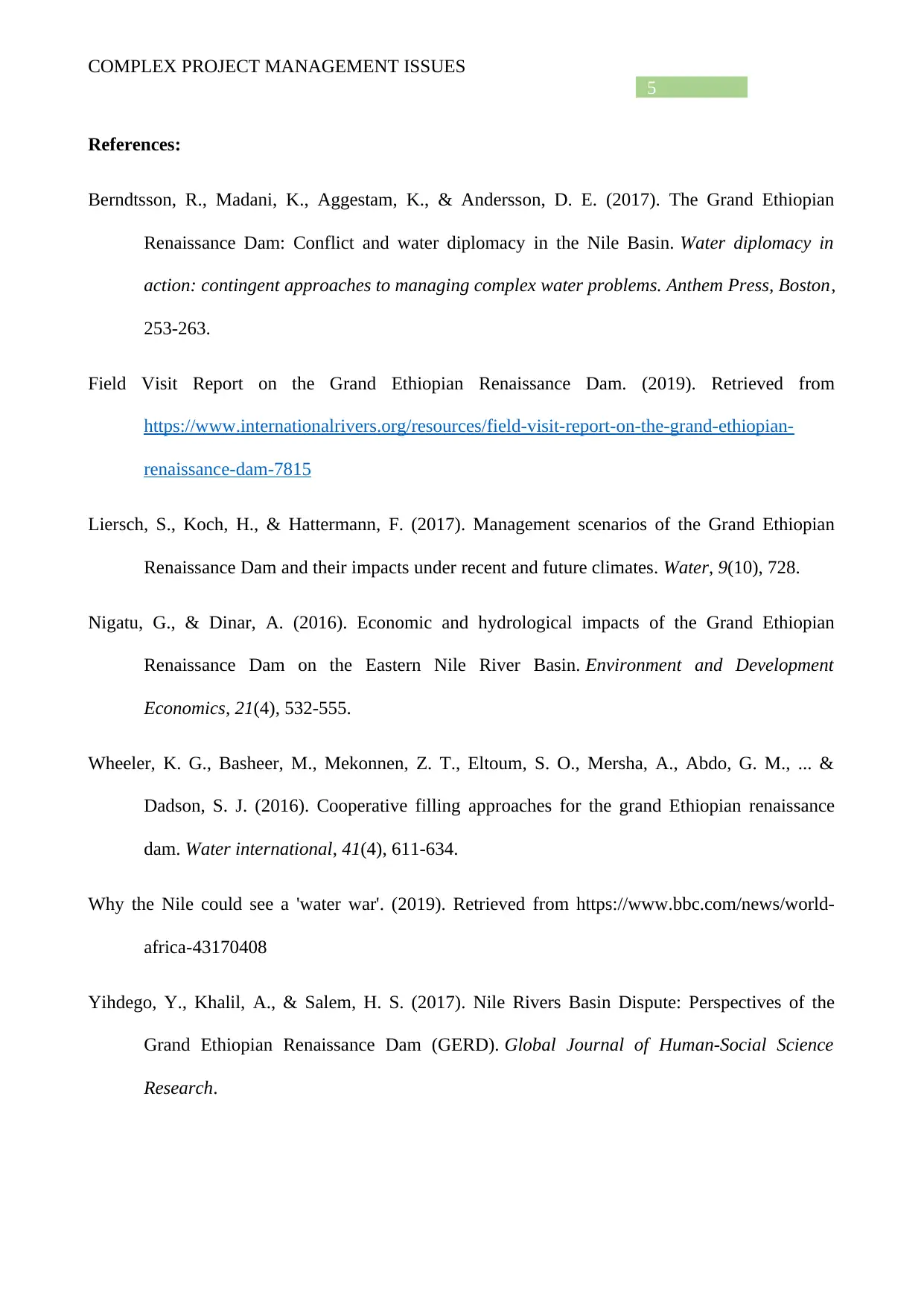
5
COMPLEX PROJECT MANAGEMENT ISSUES
References:
Berndtsson, R., Madani, K., Aggestam, K., & Andersson, D. E. (2017). The Grand Ethiopian
Renaissance Dam: Conflict and water diplomacy in the Nile Basin. Water diplomacy in
action: contingent approaches to managing complex water problems. Anthem Press, Boston,
253-263.
Field Visit Report on the Grand Ethiopian Renaissance Dam. (2019). Retrieved from
https://www.internationalrivers.org/resources/field-visit-report-on-the-grand-ethiopian-
renaissance-dam-7815
Liersch, S., Koch, H., & Hattermann, F. (2017). Management scenarios of the Grand Ethiopian
Renaissance Dam and their impacts under recent and future climates. Water, 9(10), 728.
Nigatu, G., & Dinar, A. (2016). Economic and hydrological impacts of the Grand Ethiopian
Renaissance Dam on the Eastern Nile River Basin. Environment and Development
Economics, 21(4), 532-555.
Wheeler, K. G., Basheer, M., Mekonnen, Z. T., Eltoum, S. O., Mersha, A., Abdo, G. M., ... &
Dadson, S. J. (2016). Cooperative filling approaches for the grand Ethiopian renaissance
dam. Water international, 41(4), 611-634.
Why the Nile could see a 'water war'. (2019). Retrieved from https://www.bbc.com/news/world-
africa-43170408
Yihdego, Y., Khalil, A., & Salem, H. S. (2017). Nile Rivers Basin Dispute: Perspectives of the
Grand Ethiopian Renaissance Dam (GERD). Global Journal of Human-Social Science
Research.
COMPLEX PROJECT MANAGEMENT ISSUES
References:
Berndtsson, R., Madani, K., Aggestam, K., & Andersson, D. E. (2017). The Grand Ethiopian
Renaissance Dam: Conflict and water diplomacy in the Nile Basin. Water diplomacy in
action: contingent approaches to managing complex water problems. Anthem Press, Boston,
253-263.
Field Visit Report on the Grand Ethiopian Renaissance Dam. (2019). Retrieved from
https://www.internationalrivers.org/resources/field-visit-report-on-the-grand-ethiopian-
renaissance-dam-7815
Liersch, S., Koch, H., & Hattermann, F. (2017). Management scenarios of the Grand Ethiopian
Renaissance Dam and their impacts under recent and future climates. Water, 9(10), 728.
Nigatu, G., & Dinar, A. (2016). Economic and hydrological impacts of the Grand Ethiopian
Renaissance Dam on the Eastern Nile River Basin. Environment and Development
Economics, 21(4), 532-555.
Wheeler, K. G., Basheer, M., Mekonnen, Z. T., Eltoum, S. O., Mersha, A., Abdo, G. M., ... &
Dadson, S. J. (2016). Cooperative filling approaches for the grand Ethiopian renaissance
dam. Water international, 41(4), 611-634.
Why the Nile could see a 'water war'. (2019). Retrieved from https://www.bbc.com/news/world-
africa-43170408
Yihdego, Y., Khalil, A., & Salem, H. S. (2017). Nile Rivers Basin Dispute: Perspectives of the
Grand Ethiopian Renaissance Dam (GERD). Global Journal of Human-Social Science
Research.
⊘ This is a preview!⊘
Do you want full access?
Subscribe today to unlock all pages.

Trusted by 1+ million students worldwide
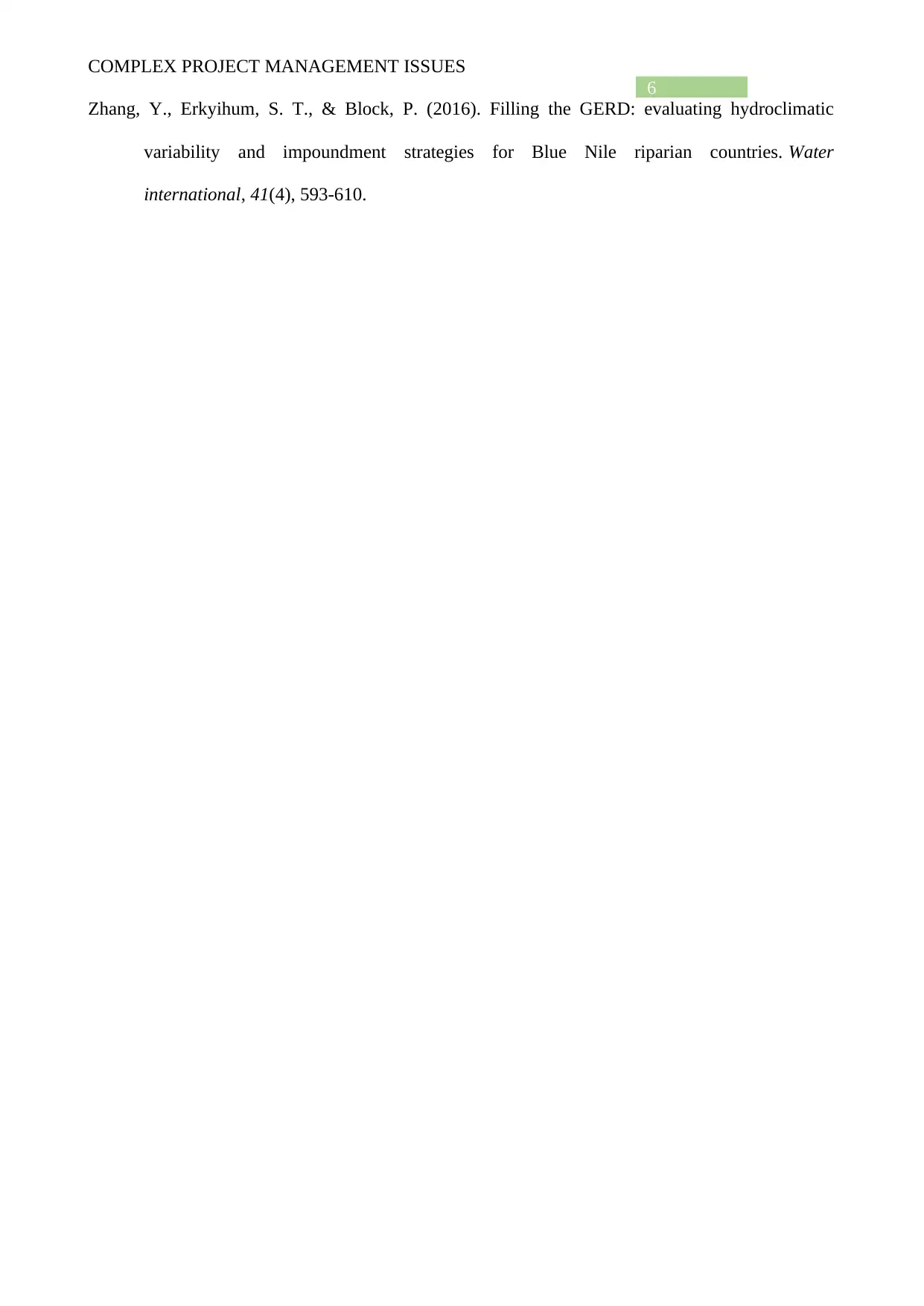
6
COMPLEX PROJECT MANAGEMENT ISSUES
Zhang, Y., Erkyihum, S. T., & Block, P. (2016). Filling the GERD: evaluating hydroclimatic
variability and impoundment strategies for Blue Nile riparian countries. Water
international, 41(4), 593-610.
COMPLEX PROJECT MANAGEMENT ISSUES
Zhang, Y., Erkyihum, S. T., & Block, P. (2016). Filling the GERD: evaluating hydroclimatic
variability and impoundment strategies for Blue Nile riparian countries. Water
international, 41(4), 593-610.
1 out of 7
Related Documents
Your All-in-One AI-Powered Toolkit for Academic Success.
+13062052269
info@desklib.com
Available 24*7 on WhatsApp / Email
![[object Object]](/_next/static/media/star-bottom.7253800d.svg)
Unlock your academic potential
Copyright © 2020–2025 A2Z Services. All Rights Reserved. Developed and managed by ZUCOL.



